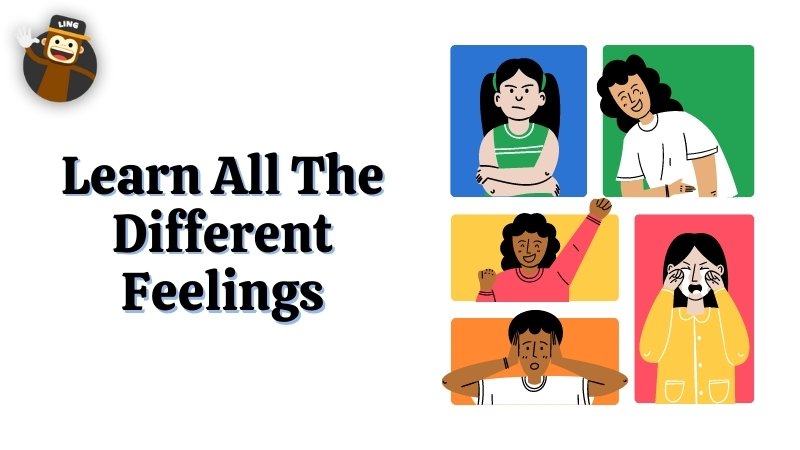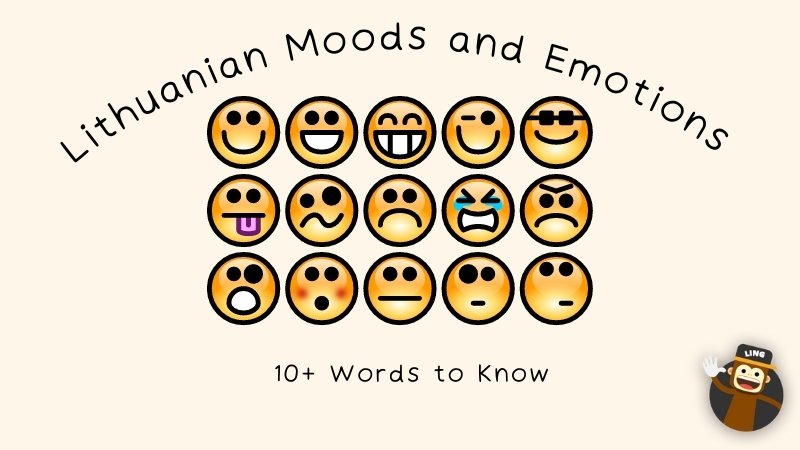Wondering what is yet to be learned and explored in the Lithuanian language? To strike conversations easier and leave a lasting impression on the locals, you must learn basic Lithuanian moods and emotions vocab today.
From being happy and sad to excited and angry, knowing the basic expressions and words related to emotions and moods can definitely come in handy, as this is something that is universal to all of us.
Also, it is crucial to know as it can help you express yourself much more clearly without leaving any room for misinterpretation. Ready to dig into the Lithuanian language? Keep reading below!

7+ Lithuanian moods and emotions Vocabulary
This section will hand out some of the most common and vital moods, pronounced as Nuotaikos and emotions, Emocijos, terms that we as human beings feel every day. Memorizing and learning these feelings (Jausmai) will help you understand the language and improve your interactive skills.
So, read thoroughly. As we know, emotions are subjective states of mind. They are responses to internal and external stimuli and are different from moods. They are basically short-lived feelings, so you can memorize these simple Lithuanian words and use them when explaining yourself to the locals.
1. Sadness (Liūdesys)
In this generation, we do not meet one person who has not gone through Liūdesys. Whether it’s a disaster or just simply feeling blue, we all have to feel sadness every once in a while. Liūdesys means sadness, which is, although one of the common negative emotions, something we all feel like a natural process.
2. Happiness (Laimė)
The opposite of sadness (Liūdesys) is what we call Laimė. Laimė means happiness, and it indicates the emotional state where a person is not feeling any grief and is in a pleasant form. Happiness is one of the positive feelings for every other human being when no problem seems to pop up.
You can give Laimė when saying compliments or just being present for your loved ones.3. Anger (Pyktis)
Coming to one of the intense emotional words, Pyktis, which means anger, is something you need to know about. We all feel angry, and especially a person like you who is traveling to a new country, extreme events can cause Pyktis (anger), making it totally normal for you to feel frustrated.
4. Fear (Baimė)
Another intense emotion that one person constantly feels on the verge of something new or dangerous apart from grief is what we call Baimė in Lithuanian. Baimė means fear and can express a person’s unpleasant feelings due to a threat or competition. It can also happen during emergencies or any unforeseen events in your life.
5. Disgust (Pasibjaurėjimas)
What do you call the feeling when something makes you completely unaroused and offended? It is called Pasibjaurėjimas and suggests strong disapproval over something or someone. For example, you are not happy about a distasteful joke that someone you know made. Pasibjaurėjimas is the perfect word for it.
6. Guilt (Kaltė)
Ever felt like a wrong event occurred due to your carelessness? For example, saying a weird word in Lithuanian and you haven’t apologized. That emotionally equipped feeling of offense and crime created due to your actions is called Kaltė. Kaltė simply means guilt, which refers to the type of feelings that make one realize their crime.
7. Anxiety (Nerimas)
One of the common emotions that has started habituating in every other teenager’s mind in the entire world is Nerimas. Nerimas is a normal emotion but with a strange intensity that can make humans feel sick. It is generally the brain’s way of responding to stress.
For example, not finding where your accommodations are while exploring the map can give a small amount of anxiety.
8. Nervous (Nervingas)
When we feel easily agitated due to a competitive situation or recognize harm, it is called Nervingas, something closely related to Nerimas. Nervingas can sometimes make people unable to work appropriately with a sober mind. Have you not felt that during school examinations?
9. Surprised (Nustebęs)
While Pyktis is an intense feeling that makes one agitated, Nustebęs can either excite the human mind with good intentions or be scared of danger. A surprise is an unexpected feeling that arises out of an unexpected event.
10. Melancholy (Melancholija)
Sometimes, an unclear event can affect the human soul in a way that it sits in long depression and pensive sadness. Such a state is called Melancholija. It is a negative mood seen in every corner of the world.
11. Bored (Nuobodžiaujantis)
When we feel unoccupied or uninterested in our current activities, we get Nuobodžiaujantis. Once we lose the patience and right mind to accept or continue our regular work, we show a sign of boredom, which means we lack the will to do something.
12. Relaxed (Atsipalaidavęs)
When one is in a mental state free of fear or anxiety, we call it Atsipalaidavęs. Atsipalaidavęs means relaxed and not under any pressure.
13. Ashamed (gėda)
Ever faced a matter where you have felt embarrassed and guilty for wrongdoing? That feeling is what we call gėda. gėda means ashamed, and in many instances, we fall into the pool of this feeling.
However, it is not the end of your language learning journey. To improve further, let us look at the best resource which I highly recommend, the Ling app.
Before learning the next part, you should try the Ling app on the Play Store or App Store.
Other Lithuanian Words For Moods And Emotions
| English | Lithuanian |
|---|---|
| Calm | Ramus |
| Cheerful | Linksmas |
| Confused | sutrikęs |
| Excited | Susijaudinęs |
| Gloomy | Niūrus |
| Joyful | Džiaugsmingas |
| Jealousy | Pavydas |
| Loneliness | Vienatvė |
| Nostalgic | Nostalgiškas |
| Overwhelmed | Priblokštas |
| Panic | Panika |
| Relief | Palengvėjimas |
| Stress | Stresas |
| Satisfaction | Pasitenkinimas |
| Sleepy | Mieguistas |
| Terrified | išsigandusi |
| Upset | Liūdnas |
Example Phrases Of Lithuanian Moods And Emotions
| English | Lithuanian |
|---|---|
| I feel sad today | Man šiandien liūdna |
| She is very excited | Ji labai susijaudinusi |
| I want to live a happy life | Noriu gyventi laimingą gyvenimą |
| Exams are making me anxious | Egzaminai mane Nerimastingas |
| I feel bored | Man nuobodu |
| Flowers give me joy | Gėlės teikia man džiaugsmo |
| I feel guilty now | Dabar jaučiuosi kalta |
Did these relevant words and phrases give you a new insight into the language and the Lithuanian vocabulary? If yes, you must possibly understand the importance of learning emotions and moods vocab now. These words take us into the realm of reality and the relationship that every other living being goes through.
Having a concrete idea of these words will definitely give a push to your Lithuanian skills and help you accept even more challenging lessons in the future.
Why Learn The Lithuanian Language?
Learning a language is not just about memorizing words and expressions. To make sense of the totality of the language, it is essential that you try to get to know its roots first. In the case of the Lithuanian language, it is basically spoken by around 2.8 million people across the globe and is considered one of the most beautiful languages in the world.
While there are some who say that this is a dying language, Lithuanian is actually very much alive as reflected by its ever-transforming structure. For this reason, there’s no surprise that many linguists are interested to learn more about this and how it managed to preserve some of the most archaic language features.
How about you? Are you still looking for reasons why you should learn Lithuanian? Well, read below some of the reasons that might convince you to take this up right away.
- Lithuanian is one of the oldest languages in the world and it reflects unique features that have been passed down throughout history. Therefore, learning Lithuanian will certainly help you be familiarized with (and also appreciate better!) the words, expressions, patterns, and pronunciation used in Europe thousands of years ago.
- It is the official language spoken in Lithuania. Planning to go on a trip for the first time? Lithuania is known for its outstanding landscapes and seascapes, which is why the country is one of the best tourist spot destinations in the world. Since Lithuanian is spoken by 80% of the population, it is a no-brainer how much it can help you if you understand at least the basic words and expressions.
- Lithuanian is spoken by communities outside the country. While it may not have a lot of native speakers, learning Lithuanian can help you forge meaningful connections with some of the Lithuanian communities based in Ireland, the U.S., Norway, Argentina, Spain, and the U.K.
- The abėcėlė of the Lithuanian alphabet is much easier to remember as compared to other languages. Since it is heavily based on Latin, language learners can easily memorize it along with the additional 8 letters. Fortunately, the additional letters are not complicated as they can be recognized right away due to the presence of diacritics and caudata.
And there you have it! If you truly want to get to know the Lithuanian language better, then let’s do that by learning some of the easiest and most useful words, like the Lithuanian moods and emotions vocabulary.
Explore The Ling App
When it comes to learning, using the right resources can take you far. Although using traditional textbooks and going to expensive language schools can help you, not everyone has enough time to commit to everyday lessons. So, if you want to learn while you are lining up for coffee or stuck on the road due to traffic, you can just use the Ling app to start learning in as little as 7 minutes per day!
Ling is an innovative language learning app with a state-of-the-art platform that is flexible and is guaranteed to make learning fun! Complete with 60+ language lessons, you can find content to learn new words, expressions, cultural points, and grammatical structures. The best part is that Ling makes learning interesting by adding videos, audio, and an AI chatbot! You no longer have to look for different websites and courses. Just download Ling and start learning the Lithuanian language and any other language of your choice now!
















